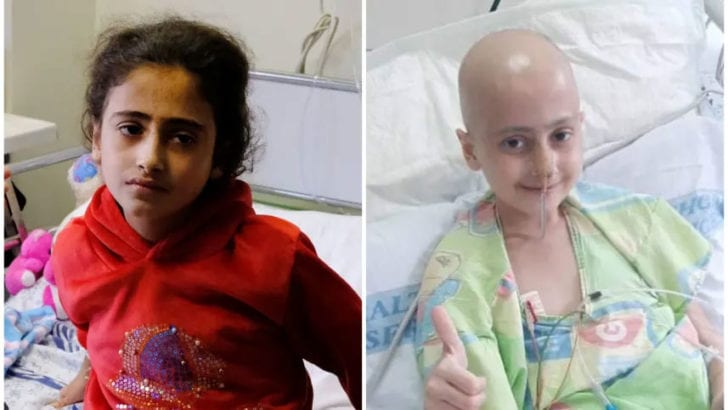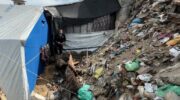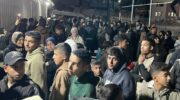Miral, the 10-year-old Gazan cancer patient whose parents weren’t allowed to be with her in a Nablus hospital, died last weekend. Now Israel is keeping another young Palestinian, who has leukemia, from receiving vital treatment.
Reposted from Ha’aretz by Gideon Levy and Alex Levac
[Note: This is an update to a previous post from 23 December 2019.]
Miral Abu Amsha died last Friday evening. The director of An-Najah University Hospital, in Nablus, Dr. Kamal Hijazi, sent a WhatsApp message on Sunday: “It breaks our hearts to let you know that Miral passed away on Friday evening. She waited for nearly two months to be transferred to a higher level of care. Makassed [in East Jerusalem] and two hospitals in Jordan wouldn’t accept her. What a sad ending for a beautiful child who endured needless suffering due to politics.”
We visited Miral two-and-half months ago in the pediatric cancer ward at An-Najah. Ten-year-old Miral was then undergoing aggressive chemotherapy treatment while being cut off from her parents, who remained locked inside the prison of the Gaza Strip. Israel had refused to let them accompany her to Nablus; only her grandmother was allowed to be by her side in the final months of her life.
When we met Miral in her hospital room, she was sitting on her bed in a red sweat suit, with indescribable suffering, pain and agony etched on her face. She tried to keep from crying in front of the strangers, but occasionally burst into tears. Her grandmother begged us to do something so that her parents would be able to be with her. It’s not difficult to imagine what they went through, listening to their daughter’s weeping on the phone every few hours but unable to be with her. After the article appeared, her mother was allowed to replace her grandmother, but Miral never saw her father again. He remained in Gaza, unable to be by his dying daughter’s side.
Last Saturday, Steve Watters, a reader from Newcastle, England, emailed me to say that two Sudanese children living in that city – Ashraf, who’s 10, and his sister, 8-year-old Shafag, the children of a friend of his – had heard about Miral and, moved by her fate, each wrote her a letter.
Shafag drew hearts and Palestine flags on hers and wrote, in pencil: “Dear Miral, I hate that you are in hospital and I hope you get better. From now on please think about getting better and you will definitely get better. The whole world depends on you. I really hope you get better. I know how you feel.”
Her brother, Ashraf, wrote: “Dear Miral, I know how you feel about the hospital. I am deeply sorry for you. I know how you feel about missing your family. I understand but you don’t have to worry from now on because you have a new family full of adorable children.”
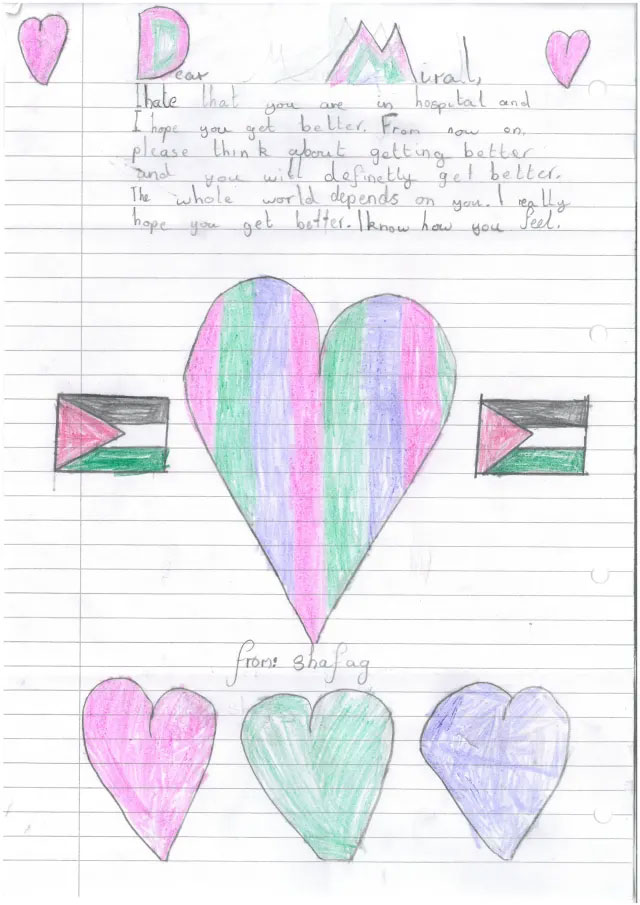
The letters were delivered to Miral last Thursday, the day before she died. Miral replied by sending a photo of herself, a feeble smile on her stricken face, deathly pale, her hair gone, making the thumbs-up sign. Watters wrote that he saw the two Sudanese children the next day and they asked how Miral was doing. He couldn’t bring himself to tell them that she had died – he would ask the children’s father to break the news to them.
Watters added in his email, “I found out Miral’s mother had been allowed to join her daughter… I guess it was December when the father last saw Miral, before her treatment started. So sad to be apart for so long and now never see each other again.” And, “Why are some Israelis so evil? Why do they think this is acceptable? Does the Israeli public know this goes on? Please tell me Israelis are better than this.”
Dr. Hijazi says he will have the children’s letters to Miral framed and hung up in the memorial corner for her that his hospital plans to set up.
Miral is not the last child from Gaza who will die without both parents at her side. Perhaps she is also not the last who will die because her parents were not allowed to be with her in her time of torment. Being cut off from parents has a serious mental and physical impact on a child with cancer.
Israel preventing children from traveling for treatment
Miral will also not be the last child from Gaza to have a hard time obtaining medical treatment in East Jerusalem or the West Bank, owing to endless, evil bureaucratic obstacles heaped up by the office of the Coordinator of Government Activities in the Territories. COGAT apparently ignores the fact that these are life-and-death cases involving children with cancer. They also forget that the idea is to transfer the youngsters to Palestinian hospitals in East Jerusalem or the West Bank – not to Israel. All security-related and bureaucratic excuses should be shunted aside to save a child’s life or alleviate their suffering. But when it comes to the mechanisms of the Israeli occupation, everything is done by the book, the book of the occupation.
Physicians for Human Rights is currently dealing with the fate of three additional young children from Gaza who have cancer, one of them just 2 years old. They are being denied permission to leave the Strip for vital medical treatment; the refusals and rejections are grounded in various strange excuses. One dire case is that of Yassin Razaka, a child of 4 who has leukemia. On one occasion he was denied entry to Nablus, as though he were a security risk; another time the authorities informed the family that he was “illegally present” (apparently, in Gaza) and therefore his entry into the West Bank for lifesaving treatment was being denied. This is a toddler suffering from cancer.
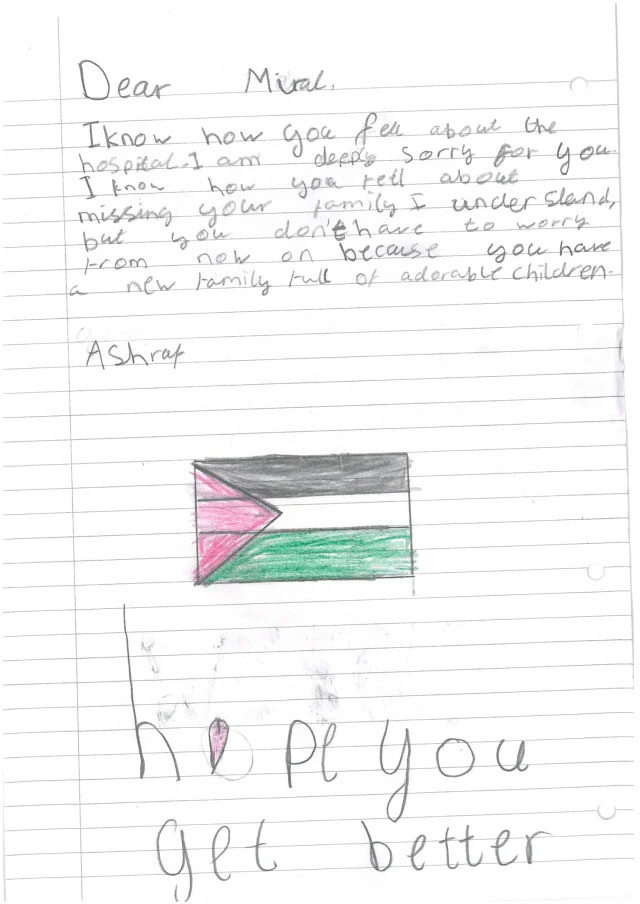
Little Yassin was diagnosed with leukemia in late November. In a Skype conversation with his parents, who are at his bedside in Rantisi Children’s Hospital in Gaza, they related that the child initially had a fever and they thought it was flu, until he started to bleed and was found to be suffering from leukemia. No proper treatment for him or other children in similar situations is available in the Strip. The staff at Rantisi referred him to An-Najah.
Yassin’s mother, Rihana, 38, was born in Beit Awwa, near Hebron, as her ID card also states. In 2011, after marrying a Gaza man, she moved to the Strip, entering via Egypt. She has remained there ever since, not even trying to request a permit to leave, for fear she will not be allowed back in. Her parents died in the West Bank, but she didn’t attend their funerals, for the same reason. Likewise, she hasn’t dared to request a permit to enter the West Bank in order to accompany Yassin.
Her husband, Ibrahim, 41, though a Gazan native, had changed his address in 2000 in the Interior Ministry’s Population Registry to Bethlehem, where he moved for a time and where he also met Rihana. But now he too is afraid to go to the West Bank for fear of not being allowed back into Gaza, where his whole family lives.
Such is life, split between the West Bank and the Gaza Strip.
In December, Yassin was taken to Nablus for chemotherapy, accompanied by the wife of Ibrahim’s uncle, Farida Saada, who received a permit. Yassin spent 46 days in An-Najah Hospital, undergoing aggressive treatment, cut off from his mother and father. After 46 days he returned home, to Dir al-Balah in the Strip, but a few weeks later, when he referred to An-Najah for further treatment, he was denied permission. This time Israel refused to let him go to Nablus on the grounds that he was illegally present.
According to documents in the possession of the organization Physicians for Human Rights, the Razaka family applied to the Palestinian Civil Committee, as required, and on January 16 was informed by that committee that Yassin was “denied” entry, and then on February 10, that he was illegally present. On February 25, Celine Jaber, from PHR, sent an additional request to the authorities to allow the child and his great aunt to travel to Nablus. “We request that you refrain from causing additional harm to the child’s health and life and allow him to leave,” the application stated.
The following reply was received the next day from 2d Lt. Shoval Yamin, of the ombudsman’s office at COGAT: “First, we would like to remind you that in accordance with protocol, all such requests must be sent to the Palestinian Civil Committee, which constitutes the responsible body for concentrating and prioritizing requests from Palestinian residents of the Gaza Strip to the Israeli side. Within this framework, we wish to inform you that a request in this matter was not conveyed to us by the Palestinian Civil Committee. It must be emphasized that your application does not constitute a substitute for the process detailed above. Accordingly, it must return to the Palestinian Civil Committee.”
Yassin missed his turn for the next round of treatment. The staff at Rantisi in Gaza warn that time is working against him. In the meantime, he is getting treatment – albeit not effective enough – that is available locally through the Palestine Children’s Relief Fund, which operates in the Gaza Strip. This week he was again given an appointment for the start of a new round of treatments in Nablus, and again missed his turn. The social worker in Rantisi Hospital, who was with the parents during our Skype conversation, said the physicians are extremely worried about what will happen to the child if he doesn’t get the chemotherapy treatment he needs so desperately.
A spokesperson for COGAT forwarded the following response to Haaretz this week: “The request of Yassin Razaka for a permit for March 15, 2020, in order to receive medical treatment in the areas of Judea and Samaria, was approved after being examined by the relevant security personnel.
We note that in the past Razaka’s request was rejected because the aforementioned is not classified as a resident of the Gaza Strip, but is registered as a resident of Judea and Samaria. Accordingly, the Coordination and Liaison Administration for the Gaza Strip requested that the Palestinian Civil Committee have the Razaka family regularize its status so as to continue handling the requests without the need to make an exception.
“We note that in 2011 the request of his father, Ibrahim Razaka, to change his status from a resident of Judea and Samaria to a resident of the Gaza Strip was approved. In contrast to Ibrahim, his wife has not yet submitted a request to change her address and did not enter the Gaza Strip through the Erez crossing, and she is therefore classified as a resident of Judea and Samaria, and her son is classified likewise.”
A few hours after Haaretz submitted an inquiry to the Israel Defense Forces, Yassin’s father received a notice from the army headed “Declaration,” stating: “I hereby inform you that your request for a transit permit from Judea and Samaria Region to the Gaza Strip was approved in light of your declaration that you intend to move, permanent basis [sic], the center of your life to the Gaza Strip.”
Ibrahim was asked to sign the document, stating that he is forgoing his West Bank residence and Population Registry designation. He told us that he never requested any such form, that the whole bureaucratic procedure was being forced upon him by the authorities and that he has no intention of signing it. He asked the staff at PHR to try to obtain an exit permit for him and his son from Gaza, but only if the NGO can ensure that he will be able to return to the Strip at the conclusion of the treatment – just as his wife has requested.
The organization’s spokesman, Ran Yaron, said that PRH generally insists that sick children be accompanied by their parents when being transferred for treatment, however, “in this case, because the NGO is unable to ensure that the father will be able to return to Gaza, and in light of his opposition to signing a form transferring his place of residence – the organization will work to have the child leave even at the price of being accompanied by someone who is not one of his parents.”
At the moment, then, Yassin Razaka is in Rantisi Hospital. His parents, who do not leave his bedside, report that he barely eats and when he does, he can’t keep the food down. He is suffering from extreme weakness, incontinence and severe stress. No one else is allowed to visit, due to his precarious condition. “It’s not only us,” Ibrahim told us from the hospital, “the whole of Gaza is imprisoned.”
A previous article by the authors reported the situation for another child:
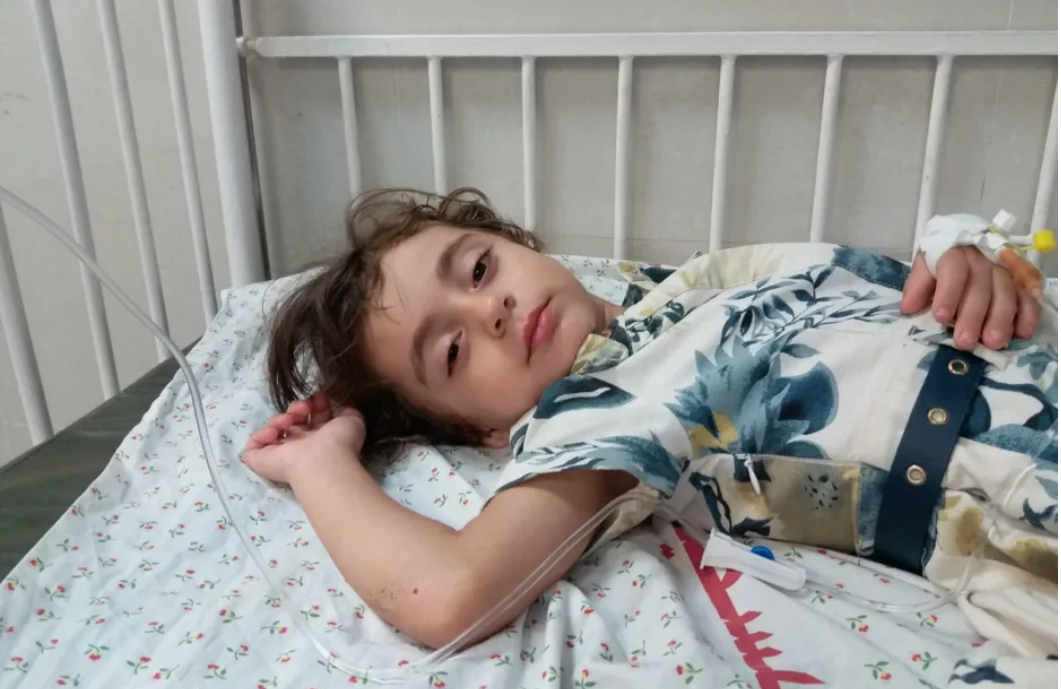
Four-year-old Rim Ahal was seriously injured last May when she accidentally drank sulfuric acid, which wreaked havoc on her internal organs. Rim gets her food through tubes and is in constant pain; her father has to take her to Rantisi Hospital in Gaza City every two days to have the tubes replaced. Since the accident, the family has submitted a number of requests for Rim to travel with her mother or her grandfather to Najah Hospital, where her condition can be ameliorated – but the District Coordination and Liaison Office didn’t bother to respond to the family’s requests or to others, from PHR. This week the request was rejected officially.
Gideon Levy is a Haaretz columnist and a member of the newspaper’s editorial board. Levy joined Haaretz in 1982, and spent four years as the newspaper’s deputy editor. He is the author of the weekly Twilight Zone feature, which covers the Israeli occupation in the West Bank and Gaza over the last 25 years, as well as the writer of political editorials for the newspaper. Levy was the recipient of the Euro-Med Journalist Prize for 2008; the Leipzig Freedom Prize in 2001; the Israeli Journalists’ Union Prize in 1997; and The Association of Human Rights in Israel Award for 1996. His new book, The Punishment of Gaza, has just been published by Verso Publishing House in London and New York.
Alex Levac is an Israeli photojournalist and street photographer. He won the Israel Prize for photography in 2005.
Our operations are funded solely by generous individuals like you. Your contribution will help us continue shining a light on the Israel/Palestine situation and the U.S. connection.
DONATERELATED:
Gazan Girl Fights Cancer Alone at West Bank Hospital – Israel Won’t Let Her Parents Join her
It takes five months to get a permit for 3-year-old from Gaza to travel for medical treatment
Israel Forces Child to Travel for Kidney Transplant without Parents
Israel: “father isn’t sick enough” for son to travel from Gaza to West Bank
There’s Hope? Israel Allows Gaza Mother to Accompany Her Toddler to Cancer Treatment
Palestinian Detainee Dies From Cancer After Being Denied Specialized Treatment

